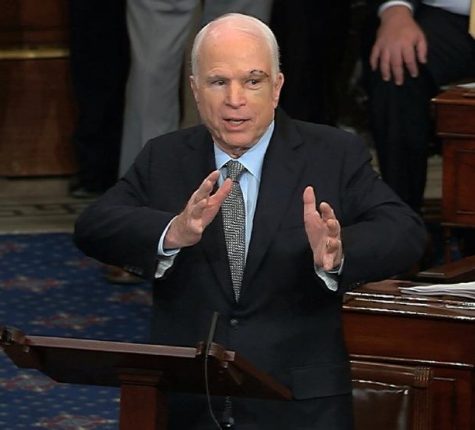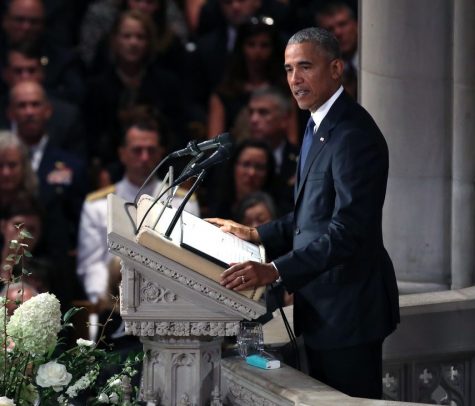Your donation will support the student journalists of Coral Gables Senior High School. Your contribution will help us cover our annual website hosting costs.
McCain leaves behind a lasting legacy
Former Senator and Presidential candidate John McCain died in August at the age of 81 after a lifetime of service to the United States.
Sep 7, 2018
John McCain was born into public service. He entered the world on a Naval Air Station in a U.S.-controlled territory, the Panama Canal Zone, and throughout his childhood, he traveled with his father to various naval postings in the U.S. and the Pacific. Both his father and grandfather were Naval academy graduates who went on to become four-star U.S. Navy Admirals. He himself graduated from a military flight school in 1960 and became a naval aviator. In short, the whole McCain family was dedicated to serving the United States.
The turning point in McCain’s life came during his time serving in Vietnam. In 1967, McCain was captured, sent to a Vietnamese prisoner-of-war (POW) camp, and was tortured. He was unwilling to use his status as the son of an admiral in the Navy to get out of camp early, an act deemed a demonstration of the selflessness and courage to which most can only aspire. He spent over five years in that POW camp and later said that it was one of the places he’d lived the longest in his life.

McCain returns to Congress for the first time since being diagnosed with glioblastoma, an aggressive form of brain cancer.
It was not only through military service, however, that John McCain served his country. After his extensive time serving in the Navy, McCain entered politics in 1977 as the Navy’s liaison to the U.S. Senate. He won a hotly contested race for the U.S. House of Representatives in 1982 in Arizona’s first congressional district, and moved up quickly into the U.S. Senate, winning in the 1986 race to replace Barry Goldwater. Though his foray into politics happened quickly, its consequences shook the nation. With two presidential runs, he quickly became one of the most influential voices in the national political landscape.
His influence, however, has finally come to a close, to the mourning of many. On Saturday, Aug. 25, McCain passed away at 81 years old from brain cancer. He took with him a lifetime of memories serving the United States, and throughout his political tenure, he was commended for his willingness to vote independent of his party and to call out incivility in politics.
Students at the school agree. “I think it’s quite sad,” Maddie Abraham, junior, said. “Even though he was not in my political party, I think he was a very good man. He helped the country in many ways… he served our country, and as a member of JROTC, I really respect him.”
In death, John McCain was lauded for his civility in an era in which some say common decency seems to have gone out the window. At his funeral in the National Cathedral, Presidents Barack Obama and George W. Bush both alluded to his integrity and generosity even in the face of defeat. He invited those who bested him in two presidential races to eulogize him, while sending no such invitation to the current president, with whom he had sparred.
“I don’t think Trump should be there, because he didn’t want him to be. I think it’s beautiful that he asked Obama and Bush to speak,” Abraham said.

Former President Barrack Obama speaks at the memorial for John McCain after McCain personally asked him and former President George W. Bush to give eulogies at his funeral.
McCain’s death comes at a time of stark political division in Washington, D.C. Throughout and after the acrimonious election season in 2016, McCain was an ardent critic of Donald Trump. As one of the only members of the Republican party to levy criticism of Trump after the primaries, he was met with comments from Trump claiming that he was not a war hero. McCain’s most audacious political move came when he revisited the Senate floor, already diagnosed with brain cancer, to vote “no” against one of his own party’s most crucial pieces of signature legislation — the bill to repeal ObamaCare.
Though McCain was staunchly criticized by many throughout the course of his political career, the outpour of public support he has received after his death is telling of a man widely admired despite opposing political views. “For all our differences,” former President Barack Obama said, “for all of the times we spared, I never tried to hide. And I think John came to understand the long-standing admiration that I had for him.”
